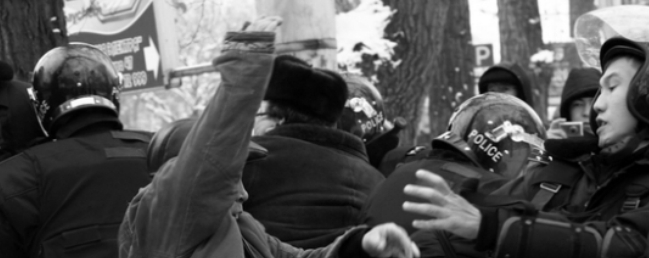In 2011, the town of Zhanaozen ('new river' in Kazakh) became a
symbol of hope for political change in Kazakhstan. For the first
time in over twenty years of independence in Kazakhstan, workers of
the fuel industry, which is integral to the country's economy,
began mass protests against exploitation and dictatorship.

Previously, they passively listened to the voices of discontent
coming from the intellectual elites of Almaty and the independent
media. Within seven months of the strike's commencement there were
no observed instances of violations of public order by its
members. Despite the peaceful form of the industrial action,
the authoritarian government failed to enter into dialogue with the
strikers.
In order to suppress the protest, security services used
provocation, beatings carried out by 'unidentified attackers',
social pressure, staged accidents and sent oil workers and
activists to detention centres. In December 2011, the strike was
stopped by force.

The tragic events in Zhanaozen seriously undermined the
credibility of President Nursultan Nazarbayev. The bloodshed in
this town, located in the desert, has become a tragic symbol in the
history of the country, but these events have also brought hope for
political changes in Kazakhstan.
Events in Zhanaozen - calendar
11 MAY 2011
Employees of the 'OzenMunayGaz', 'Karazhanbasmunai' and 'Ersai
Caspian Contractor' went on strike, putting forward demands to end
discrimination based on nationality (local workers received lower
salaries and worked in less favourable conditions than foreigners),
to improve the working conditions, to increase salaries and to
observe collective agreements.
27 MAY 2011
The city court of Zhanaozen deemed the strike illegal, at the
same time promised intervention of investigative bodies against
protesters.
MAY-DECEMBER 2011
Mass dismissals of striking workers, provocations and batteries
carried out by unknown attackers, police officers and security
services, as well as arrests took place. In this connection, the
strikers put forward additional demands: to stop the persecution,
to give consent to the registration of independent labour unions
and to release the detained activists and opposition leaders.
16 DECEMBER 2011
Brutal suppression of the strike, which began on the Day of
Independence of Kazakhstan (16.12.2011), took place. According to
official data, in the town of Zhanaozen and the village of Shepte,
17 oil workers as well as random victims were killed by the police
and security services. Independent estimates, based on the reports
of witnesses and medical workers, quote as many as 80-100
casualties.
17 DECEMBER 2011
A state of emergency was announced, roads leading to the city
were blocked, the landing of aircraft at the airport was
prohibited, mobile communication and Internet connection was
disrupted.
23 JANUARY 2012
Vladimir Kozlov, who had taken part in the provision of
assistance to the striking workers, was arrested. He has been
accused of inciting social hatred, leadership and participation in
a criminal group, as well as an attempt to violently overthrow the
government.
MAY - JUNE 2012
The arrested strikers were sentenced to several years in
prison.
16 AUGUST 2012
The trial against Vladimir Kozlov commenced. He faced a
punishment of up to 9 years' imprisonment.
8 OCTOBER 2012
Vladmir Kozlov was sentenced to 7 years and 6 months in
prison.









